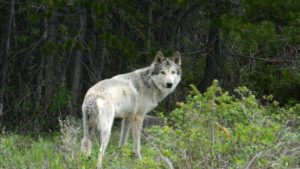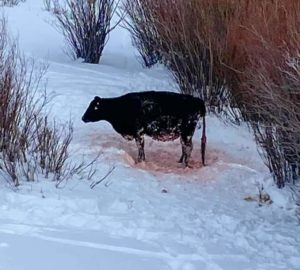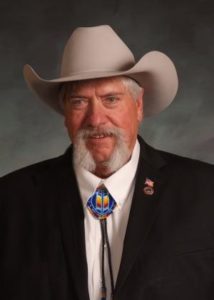
By Shannon Lukens.

Three wolf-related bipartisan bills are being introduced in the Colorado State Legislature today, by a bipartisan group of Western Slope legislators.
One is the 10J Rule Bill which would allow ranchers and Colorado Parks and Wildlife to have management flexibility. An example would be lethal management and mitigation if a wolf is attacking livestock or working ranch animals. A federal decision confirming that is expected by Dec. 15 but the local legislators say they are concerned that will happen by that date. They want to make sure the 10J Rule is in effect. It is currently under review by NEPA, which is the National Environmental Policy Act, which could delay the federal ruling. This legislation from the Colorado legislators could possibly then delay the actual release of wolves by Dec. 31, until the 10J Rule is officially adopted and in effect.
SB23-256 will be introduced first in the Colorado Senate. Sponsors are: Senators Perry Will, R-New Castle, and Dylan Roberts, D-Avon, and Representatives Meghan Lukens, D-Steamboat Springs, and Matt Soper, R-Delta.
The full press release and list of supporters is below.

The second bill is SB23-255, which is a Compensation Bill for livestock owners to be reimbursed if they suffer the loss or injury of their animals from wolf attacks. This is a dedicated “wolf compensation fund” that will have $350,000 a year within in the Department of Natural Resources. That money will come out of the state’s General Fund. This is also being introduced in the Colorado Senate this week.
Sponsors are: Senators Perry Will, R-New Castle, and Dylan Roberts, D-Avon, House Speaker Julie McCluskie, D-Dillon, and Rep. Marc Catlin, R-Montrose.

The third bill is HB23-1265, which is a license plate bill to be introduced in the State House today. It’s a “Born to be Wild” special license plate, which you can get for $100, half of which goes to support ranchers using non-lethal methods of mitigation to deter wolves. A minimum of 3,000 of these plates needs to be pre-ordered in order for it to be official and that minimum has been surpassed.
Sponsors are: Representative Meghan Lukens, D-Steamboat Springs and Representative Elizabeth Velasco, D-Glenwood Springs, and Senators Perry Will, R-New Castle and Janice Marchman, D-Loveland.

Senator Dylan Roberts (D) represents Senate District 8 which includes Northwest Colorado.
“This is something that we can do for our constituents who, like all of us, were opposed to the reintroduction of wolves but because it is state law, what we can do is stand up for our constituents to make sure they have the tools and the compensation to deal with the impacts of it.”

Senator Perry Will (R) knows there is strong bipartisan support throughout the Western Slope, and in the House and Senate.
“And Dylan’s got all the Ag Committee. And that’s bipartisan, the entire Ag Committee, he has as co-sponsors on this. And Dylan’s side of the aisle, there in the Senate, too, you’ll get a bunch of those. And I know Meghan’s got a bunch of them in the House have already signed on as co-sponsors, right?”
“Yes, for the 10J Bill, since my name’s on that, we have almost the entire Western Slope delegation signed on as co-sponsors, and then a few more rural colleagues as well, from the Eastern Slope.”
“And we’ll get the East Slope, too. I think Dylan already has them, actually. I think just rural Colorado, just in general. I think that anyone out in rural Colorado on the Eastern or Western Slope is going to jump on this and I’m sure we’ll get a few from the Front Range as well.”

Representative Meghan Lukens (D) is sponsoring the license plate bill which is being introduced today in the Colorado House.
“All three bills have been the work of all Western Slope Legislatures. All legislators from the Western Slope have some sort of hand in all of these bills, whether they are a prime sponsor or a co-sponsor. So I really see this as a bipartisan coalition of Western Slope legislators coming together as a direct response to asks from our constituents to support our constituents in the navigating of wolves being on the ground and the ramifications of that. These are three bills that are all in direct response to our constituents. We know that our agricultural communities are so important to the entire state of Colorado and the Western Slope. And it’s imperative that we continue to support our agricultural communities and these three bills are all our attempt to really support our agricultural communities as we navigate the impacts of wolves.”
From the Office of Senator Dylan Roberts; March 28, 2023.
Western Slope Legislators Introduce Bipartisan Legislation to Mitigate Wolf Reintroduction Impacts
DENVER, CO – A bipartisan group of legislators introduced three bills today aimed at protecting rural Coloradans and their livestock. These bills would ensure the Colorado Parks and Wildlife (CPW) has adequate resources to mitigate wolf conflict, fairly compensate livestock owners for their losses, and enact the voter’s intent behind 2020’s Proposition 114, which mandates the reintroduction of wolves by December 31, 2023.
The bills introduced to support ranchers and communities impacted by wolf reintroduction include SB23-255, SB23-256, and HB23-1265. Together, these bills would reduce the negative impacts of wolf interaction with ranches, farms, and communities.
SB23-256, sponsored by Senators Perry Will, R-New Castle, and Dylan Roberts, D-Avon, and Representatives Meghan Lukens, D-Steamboat Springs, and Matt Soper, R-Delta, would ensure that prior to the reintroduction of wolves, a 10J Rule has been granted to Colorado from the U.S. Department of Interior. When the gray wolf was listed as an endangered species in February 2022, proper management tools for CPW and Colorado livestock owners were restricted.
A 10J Rule would allow the state to manage wolves in cooperation with the USFWS as an “experimental population” with more flexibility than typically afforded to listed species. It would permit ranchers and property owners to utilize lethal action as a method of last resort if their livestock or working animals are in immediate danger.
CPW is already in the process of requesting a 10J Rule from the federal government with hopes of its approval by December 15, 2023. Should any delay occur, this bill would ensure that reintroduction is paused until the 10J is in effect.
SB23-255, sponsored by Senators Roberts and Will, House Speaker Julie McCluskie, D-Dillon, and Rep. Marc Catlin, R-Montrose, will create a dedicated “wolf compensation fund” within the Colorado Department of Natural Resources to be reserved for compensating livestock owners who suffer the loss or injury of their animals from wolf attacks. Proposition 114 included language that guaranteed livestock owners be compensated for their losses and the creation of this dedicated funding source honors that commitment.
HB23-1265 sponsored by Representatives Lukens and Elizabeth Velasco, D-Glenwood Springs, and Senators Will and Janice Marchman, D-Loveland, would authorize the creation of a “Born to Be Wild” license plate for Coloradans to purchase, which honors Colorado wildlife. The excess funds collected from this specialty license plate would be allocated to ranchers and farmers to help them implement nonlethal means of mitigating and preventing conflict with gray wolves.
“By establishing a compensation fund for Coloradans who suffer livestock losses from wolves, we are doubling down on our commitment to protect our farmers, ranchers and the Western Slope way of life,” said Speaker McCluskie, D-Dillon. “Our bipartisan legislative package works with the Colorado Parks and Wildlife to help mitigate the effects of wolf reintroduction, protect Coloradans’ livelihood and respect the new regulations approved by voters in Prop 114.”
“My constituents in central and Northwest Colorado will be directly impacted by the reintroduction of wolves into Colorado. These bills are a commitment to protecting those who will have to live daily with the impacts of wolves on the ground in Colorado by giving them the tools and resources they deserve to effectively manage those impacts,” said Senator Dylan Roberts, D-Avon. “It is vital that a 10J Rule is in effect before wolves are released and that an adequate source of funding to compensate ranchers for their losses is guaranteed and I am looking forward to working with my colleagues on both sides of the aisle to get these two vital bills to the Governor’s desk.”
“Having a 10J allows Colorado to have management of wolves in our state in cooperation with USFWS. This management flexibility is critical to the success of the wolf reintroduction plan,” said Senator Perry Will, R-New Castle. “Further, secure funding for conflict prevention and livestock depredation compensation is critical for success of the plan and non-lethal prevention techniques and compensation to producers livestock loss is a must!”
“I am proud to be sponsoring these bills alongside members of both parties. This is a bipartisan effort that prioritizes our ranching and farming communities,” said Rep. Meghan Lukens, D-Steamboat Springs. “These bills are all a direct response to appeals from our constituents on the Western Slope – specifically the 10J Rule and compensation bills – and are imperative to supporting our agricultural communities as we navigate ramifications of wolves.”
“I recognize that the reintroduction of wolves will have impacts on our rural communities. We must protect our way of life and safeguard our ranchers to preserve agriculture, an important part of Colorado’s economy. We need all the tools in the tool box. I am proud of the coalition of Western slope voices coming together to find solutions that work for us.” said Rep. Elizabeth Velasco, D-Glenwood Springs.
10J Rule Fact Sheet from the Colorado Senate; March 27, 2023.
SB23-256: Concerning Prerequisites to the Management of Gray Wolves Prior to Reintroduction
Senators Perry Will & Dylan Roberts / Reps. Meghan Lukens & Matthew Soper
Background:
In November 2020, Colorado voters passed Proposition 114 requiring that a program re-introducing gray wolves to Western Colorado be initiated by December 31, 2023. The ballot initiative was subsequently codified as section 33-2-105.8 CRS. Then, in February 2022, wolves were placed back on the Endangered Species list, which puts them under the ordinance of USFWS and complicates CPW’s ability to manage reintroduction in a way that protects livestock owners.
CPW has requested that the USFWS approve what is known as a “10J Rule,” which would allow the state to cooperate with USFWS to manage wolves as an “experimental population.” Granting a “10J” would provide the state more flexibility in managing reintroduction than is typically granted for other endangered species.
What would this bill do:
This bill does two things. It mandates that wolf reintroduction cannot happen until:
1. The U.S. Dept. of Interior has made a final determination in accordance with the
Endangered Species Act, 16 U.S.C. section 1539(j) (aka granted a 10J), and
2. A complete analysis of the associated environmental impacts is completed in accordance
with the National Environmental Policy Act (NEPA).
Supporters:
Breen Community Building
Chamisa Ranch LLC
Colorado Bowhunters Association
Coloradans for Responsible Wildlife Management
Colorado Cattlemen’s Association
Colorado Conservation Alliance
Colorado Farm Bureau
Colorado Independent Cattle Growers Association
Colorado Land, Water & Food Alliance
Colorado Outfitters Association
Colorado State Muzzleloaders Association
Colorado Trappers and Predator Hunters Association
Colorado Women Involved in Farm Economics
Congressional Sportsmen’s Foundation
Fort Lewis Mesa Planning District
Gunnison County Stockgrowers Association
Hay Gulch Ditch Inc.
Highlands Unlimited Inc.
Huntington Ranches LLC
Keep Routt Wild
Kikel Ranch LLC
La Plata County Farm Bureau
La Plata Water Conservancy District
Landowners of La Plata
Muley Fanatic Foundation
National Wild Turkey Federation
Professional Outfitters and Guides of America
Razor Creek Ranch LLC
Rocky Mountain Elk Foundation (RMEF)
Rocky Mountain Farmers Union (RMFU)
Safari Club International
Slade Irrigation Company Inc.
Southern Colorado Livestock Association
Southwestern Colorado Livestock Association
Frequently Asked Questions
What is a 10J Rule?
Under section 10(j), the USFWS may designate a population of a listed species as “experimental” if it will be released into suitable natural habitat outside the species’ current range. With the special allowances afforded under the 10(j) rule, state agencies can devise management programs and landowners can continue to manage their lands without concern about violating the ESA by harming the species (be it inadvertently or out of necessity.)
Why do we need a 10J Rule?
As required by the ballot initiative, CPW has engaged in a two-year stakeholder process to develop a Wolf Management Plan. As noted on page (iii) of the Draft Plan:
“The 10(j) rule provides management flexibility that is a critical component to the success of this Plan and on which other components of the Plan depend.”
I have heard that the 10J Rule would allow for wolf hunting – is that true?
No, absolutely not. If a 10J Rule is adopted then taking lethal action would only be permissible under very specific circumstances, such as preventing the imminent killing of livestock.
Will this bill cause the reintroduction of wolves to be delayed?
Possibly. The 10J Rule proposal is currently undergoing NEPA review. The USFWS has expressed its intent to complete the EIS of the 10J Rule in time to comply with the December 31, 2023 deadline. However, if the proposed rule is challenged legally, that could delay its final adoption. This legislation would delay the actual release of wolves until the 10J Rule is finally adopted and in effect.